|
|
|
Sort Order |
|
|
|
Items / Page
|
|
|
|
|
|
|
| Srl | Item |
| 1 |
ID:
138783
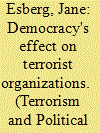

|
|
|
|
|
| Summary/Abstract |
How does democracy influence terrorism? The regime-responsive school argues that lack of representation in autocracies motivates violence; the regime-permissive school posits that individual liberty in democracies allows it. The schools thus disagree about the democratic feature to which violence responds—representation or individual liberty. These arguments are problematic in two ways. First, neither accounts for the potentially competing effects of different democratic features. Second, treating terrorism as a set response to operating context ignores the operational processes behind violence, described in organizational theories of terrorism. This article develops a bridge between the regime-responsive and regime-permissive schools by applying organizational theories of terrorism to their key arguments. I argue that representation and individual liberty have independent, and sometimes competing, effects on armed groups' missions, hierarchies, and membership—collectively organizational capacity, the ability to survive and influence the environment. This explains the mixed effects of democracy on terrorism: both high-functioning democracy and repressive autocracy weaken organizational capacity, but decreased representation in a democracy or higher individual liberty in an autocracy removes organizational stresses. New research on Chile between 1965 and 1995—representing five government periods, with four armed groups operating—acts as an initial test of these relationships.
|
|
|
|
|
|
|
|
|
|
|
|
|
|
|
|
| 2 |
ID:
142260
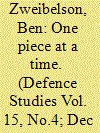

|
|
|
|
|
| Summary/Abstract |
The recent strategic failures in Iraq and Afghanistan for military coalitions illustrate that we have significant problems with understanding how and why we plan military campaigns in ways that over time demonstrate ineffectiveness and confusion. Arguably, we may not realize why we construct insufficient campaign plans because we are not even aware of our cognitive behaviors. This article critically charges that our entire approach to understanding conflict and our subsequent military planning methodologies stem from highly limited yet deeply cherished conceptual models that operate behind the scenes. We hardly realize them, yet they dominate our very understanding of how we imagine the world functions. With military campaign plans, our centralized hierarchies, linear causality reasoning, and other significant sociological forces send us into cycles of poor planning along with institutional blinders that resist critical reflection on why we are failing.
|
|
|
|
|
|
|
|
|
|
|
|
|
|
|
|
| 3 |
ID:
121426
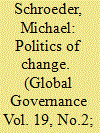

|
|
|
|
|
| Publication |
2013.
|
| Summary/Abstract |
The United Nations and many members were unenthusiastic when Nicaragua, a sovereign state, invited the UN to observe its elections in 1989. However, the UN accepted the invitation, and UN electoral services have since reached over 100 members. This article investigates UN involvement in elections from 1989 to 2006 and identifies important changes over that time in the kinds of electoral services that the UN provided. These changes cannot be explained solely by shifts in member interests, international norms, the distribution of power, or the market for electoral services. Instead, the UN made modest reforms to manage the conflicting pressures that these external shifts produced without stretching scarce resources or weakening its perceived legitimacy. However, each modest reform-an exception, symbolic institutional change, or new leadership vision-triggered additional changes by reconstituting member or bureaucratic preferences. This article specifically highlights three change processes that these reforms triggered: normalizing deviance, expanding demand, and offering political cover. These findings have important implications for scholarship on UN reform, the provision of electoral services, and the role of the UN's leadership.
|
|
|
|
|
|
|
|
|
|
|
|
|
|
|
|
| 4 |
ID:
105953
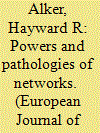

|
|
|
|
|
| Publication |
2011.
|
| Summary/Abstract |
This article reconstructs Karl Deutsch's fearful yet hopeful views about the powers and
pathologies of military, and other, national and international network systems. These
views presuppose Norbert Wiener's Cybernetic Interpretive Hypothesis: that 'society
can only be understood through a study of the messages and communication facilities
which belong to it'; that the societal trend is towards more computerized communication
systems; and that they embody an 'open vs. closed' living systems ethos. Drawing on
science and technology studies by Edwards and Mirowski, the author suggests how
Deutsch's and Wiener's prophetic hopes, fears, and insights can also enrich and redefine
contemporary debates about the historical-technological development of our national
societies, the powers and pathologies of game-theoretically programmed computer
networks, the assessment of the life-preserving potential of our partly automated
security systems, the major threats from the continued poverty of the less developed
world, problems of decentralized governance, and the political, ethical, and religious
justifications for our national, international, and civilizational identities and purposes.
|
|
|
|
|
|
|
|
|
|
|
|
|
|
|
|
| 5 |
ID:
143611
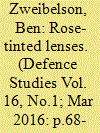

|
|
|
|
|
| Summary/Abstract |
Strategists and military professionals have previously questioned many of the methodological (theoretical underpinnings, the principles, and rules applied by the discipline) decisions associated with American military strategy, but the direction this essay takes is above and beyond the common methodological rivalries in how we pursue strategic desired future states. To get beyond methodological disputes entirely, we must consider thinking about our thinking as an organization on American strategy. Thus, this article hovers between philosophies, organizational theory, as well as our usually unquestioned belief in something called “strategy”. Questioning things about our basic understanding of the world tends to trigger strong organizational defense mechanisms, for good reason. Critical reflection at deep levels puts our worldview, and our role within it at stake. Nonetheless, as strategic disappointment emerges over multiple complex conflict developments, even the most cherished and guarded choices on how the world ought to work are ripe for critical inquiry. This essay examines the limited single strategic paradigm of the US defense industry and how the latest American National Security Strategy and Army Future Operating Concept (Win in a Complex World through 2030) presents a flawed strategic position. This essay presents valid alternative strategies that operate within different paradigmatic constructs.
|
|
|
|
|
|
|
|
|
|
|
|
|
|
|
|
| 6 |
ID:
079571
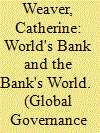

|
|
|
|
|
| Publication |
2007.
|
| Summary/Abstract |
Who or what shapes and drives the policy and operational behavior of the World Bank? The objective of this essay is to lay the conceptual and empirical framework for this special issue. I begin by constructing a synthetic theoretical model-drawing from principal-agent models and sociological institutionalism-to delineate the set of external and internal factors shaping Bank behavior. I then lay the empirical groundwork by exploring the most salient characteristics of the "world's Bank," taking special note of the Bank's relationship with the United States, borrowing states, and nongovernmental organizations. In the second half, I focus on the "Bank's world," investigating the internal bureaucratic politics and culture of the Bank. Specifically, I examine the sources and nature of the Bank's "intellectual culture" (characterized by its economistic, apolitical, and technical rationality), its "operational culture" (portrayed as driven by approval and disbursement imperatives), and the dynamics of bureaucratic politics that pervade the hierarchy of the Bank.
|
|
|
|
|
|
|
|
|
|
|
|
|
|
|
|
|
|
|
|
|